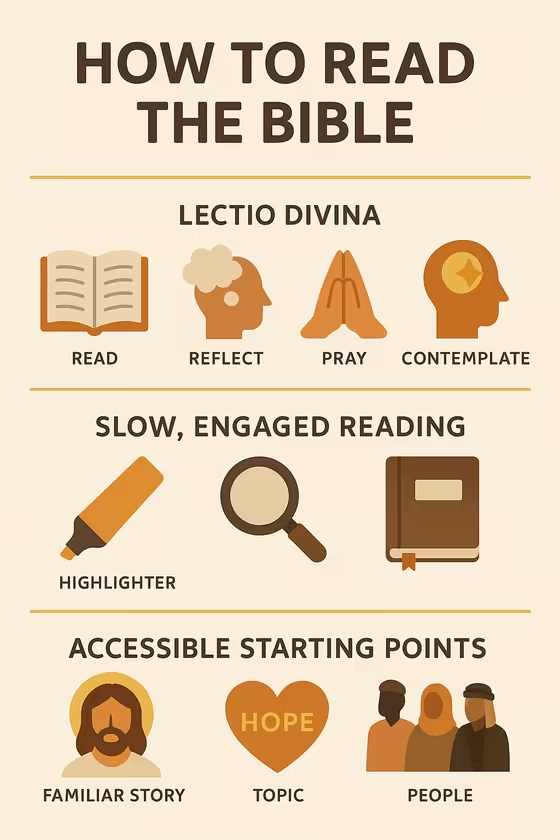How to Find God
Where Do I Even Start?
What Does "Finding God" Mean?
The phrase "finding God" means different things to different people. It’s not like finding your keys or discovering a new place. It’s about big changes in how you see the world.
For some, it's like waking up inside. God isn't someone you find outside of yourself. Instead, God is an energy or force inside you that connects everything. The real question is, are you aware of God's presence right now?
For others, finding God is about relationships. Hard times like a broken heart or a serious illness can make people look for a perfect, unconditional love. Finding God means finding a divine relationship that offers hope when human relationships fail.
You can also see it as a way to find new meaning in life. When you become aware of God, you get a new way to understand yourself and the world. This helps you find hope and guidance, even during a crisis.
This brings up a big question: is finding God a single event or a lifelong journey? The simple answer is that it's both.
Actively looking for God is a continuous journey. It’s an ongoing effort to build a personal relationship with him.
But this long journey often starts with a single moment of "finding." Christian belief explains this with two ideas: Justification and Sanctification.
Justification is the "finding" part. It’s a one-time event when you are saved. At that moment, God declares you righteous and forgives your sins. It's when you are "born again" and become a child of God.
Sanctification is the "seeking" part. This is the lifelong process that comes after you are saved. It's about becoming more like Jesus with the help of the Holy Spirit.
So, the "finding" moment isn't the end. It's the beginning of the real journey. That one-time event gives you what you need for the lifelong process of seeking God.
| Aspect | The "Finding" (Justification) | The "Seeking" (Sanctification) |
|---|---|---|
| What It's Like | A one-time event; a destination reached. | A lifelong journey; a transformation. |
| Theological Term | Justification | Sanctification |
| Key Action | God declares you righteous. | The Holy Spirit makes you righteous. |
| Timing | Happens instantly. | A lifelong process; continuous. |
| Core Idea | You are saved by your status in Christ. | You become holy in practice and work out your salvation. |
This shows that the search is about changing how you see things, not about finding a God who is lost. God isn't hiding from you. The goal is to open yourself up to a presence that is already there.
This leads to another big question. Do we find God through our own efforts, or does God reveal himself to us? Is it about human reason or God's grace?
One path is through reason and nature. Some believe you can find knowledge of God using your own mind. This can be through logic or just an inner feeling or sense of the divine.
The other path is through revelation. This is when God shows himself to us, like in the Bible or through Jesus. This kind of knowing is a gift based on faith.

There's a big difference between knowing about God and actually knowing God. Studying religion might only get you to a point of knowing about him. Revelation, on the other hand, is when God becomes real to you and you build a relationship.
Our own search is important because it makes us want to find God. But sometimes, searching on your own leads to a tough question. If a loving God wants to be found, why is it so hard for some people?
This is where our own search has to give way to something more. The word for revelation in Greek, apokalypsis , means "removing a veil." Our search can take us to the veil, but only God's grace can remove it for us . Both our reason and God's revelation work together on this journey.
Why Do We Start Looking?
People usually don't start looking for God just because they're curious. Most of the time, something big in their life pushes them to start the search.
The most common reason is a personal crisis. Tough times often lead to spiritual growth. It could be a divorce, a cancer diagnosis, or a child getting sick. These moments make us feel helpless and force us to look for a higher power.
Another reason is a feeling of meaninglessness. This happens when you wonder what the point of life is, as the Book of Ecclesiastes says, "We all die in the end... Everything's smoke." People have an unstoppable desire to know the ultimate meaning of things , and faith can provide that.
Sometimes, the search starts from a place of awe and wonder. It's not about pain, but about beauty. It might be the feeling you get when you walk into a beautiful cathedral and feel like it's telling you something about God.
All these reasons come down to a basic human need for purpose. The search for God is often the same as the search for meaning in life. In fact, some say our very desire for purpose is a proof of God.
So, the spiritual journey often begins when we realize we can't control everything. Faith provides a framework that helps people make sense of difficult things. People turn to God because he is their Creator and knows their purpose.
The search for God requires a big shift in your life. This idea is captured in the Bible in Matthew 6:33. "But seek first the kingdom of God and His righteousness, and all these things will be added unto you."
This verse is a core idea in Christianity. To "seek God first" means making him your main focus in everything. It's a call to say yes to God before anything else.
This isn't just about being obedient. It's a practical way to deal with a world full of distractions. You have to make time for God, not just hope you find some extra time.
By putting God first, you stop chasing after things that cause anxiety. The idea is that if you focus on God, all the other things you worry about will fall into place. When you trust God to take care of you, you find that he's already got it covered.
How to Start Looking for God
Finding God in the Bible
The Bible gives direct instructions for anyone looking for God. Two passages are really important here.
The first is Jeremiah 29:13: "You will seek me and find me when you seek me with all your heart." This promise was given to the Israelites when they were suffering in exile. The key condition is that you have to seek him sincerely .
The second is Matthew 7:7: "Ask, and it will be given to you; seek, and you will find; knock, and it will be opened to you." This is an invitation from Jesus to keep trying. The words "ask, seek, and knock" show different levels of effort and persistence in prayer.
But this isn't a magic formula. Sometimes prayers seem to go unanswered. This might be because of doubt, disobedience, or asking for the wrong reasons.
To connect with the Bible, you need to read it for spiritual growth, not just for knowledge. The goal is to be changed by it. You want to listen for Jesus' voice and build a relationship with God.
Here are a few ways to do that:
- Lectio Divina (Spiritual Reading): This is an old practice with four steps. You read a passage slowly, reflect on it, pray about it, and think about what it means for your life.
- Slow, Engaged Reading: Don't rush through it just to check a box. Read slowly and focus on understanding. Underline things, re-read passages, and write down your thoughts in a journal.
-
Accessible Starting Points: Reading the Bible from start to finish can be tough. Instead, try one of these approaches:
- Start with what's familiar : Read the stories about Jesus in the Gospel of Mark or Luke.
- Follow your interests : Do a study on a topic you care about, like hope or patience.
- Study the people : Learn about the real people in the Bible and see their strengths and weaknesses.

The Bible shows that there's no single way to find God. The stories of different people prove this.
- The Obedient Path (Joshua) : Joshua found God's purpose by following the rules he was already given in the "Book of the Law." His story is for people who connect through discipline and study.
- The Unexpected Path (Moses) : Moses wasn't looking for God when he was called. God interrupted his normal life with the burning bush. His journey was about learning to trust God and overcome his fears.
- The Adversarial Path (Paul) : Paul was an enemy of the early church. He was a religious extremist who was actively fighting against Christians. His miraculous encounter with Christ shows that God can reach anyone.
These stories show that it doesn't matter where you start. All of these people were imperfect and faced challenges. The important thing is that God is willing to meet you wherever you are.
Finding God Through Prayer and Life
For many, prayer feels like talking to a wall. That's because we often focus on talking, not listening. The key is to practice silence, which teaches us how to listen and get rid of distractions.
Being silent can be scary. You might worry you won't hear anything, or you might worry that you will. Hearing God's voice is a skill you have to develop. A good way to start is by learning to listen to God in the Bible.
The goal of silent prayer is to quiet the noise in your heart and mind. This helps you become tuned in to the gentle whispers of the Holy Spirit.
Here are a few simple ways to practice listening prayer:
- Contemplative Prayer : This is simply sitting, waiting, and listening for God. Unlike some meditation that tries to empty your mind, Christian meditation is about filling you up with God's presence .
- Centering Prayer : One method is to sit quietly and repeat a single word, like "love" or "Jesus," in your mind. This helps you focus. When your mind starts to wander, you just gently bring it back to the word.
- Journaling : Write down any thoughts, pictures, or words that come to you during prayer. Over time, you may start to see patterns that show you how God is speaking to you.
The search for God shouldn't just be limited to special times like prayer. The goal is to find him in all parts of your life. This idea is sometimes called "Finding God in all things."
This doesn't mean God is everything. It just means that God is always present, and our job is to notice, accept, and celebrate that presence.
A practical way to do this is with the Ignatian Examen. This is a simple way to check in with God at the end of each day . You review your day and think about where you saw God's grace at work. This simple practice trains you to notice God in your daily life.
Many people think of finding God as a solo journey. But faith communities and church services are very important. They are a key part of the search.
A church community helps in two main ways:
- It helps you connect : Worshiping with others is a powerful experience. It's a chance to share your faith, learn from others, and celebrate God together.
- It protects you : Being isolated can be spiritually dangerous. After a hard week, worshiping with others reminds you that you aren't alone . It helps you shift your focus from your own problems back to God.
Using Your Brain to Find God
Some people think faith means you have to turn off your brain. That's not true. Christianity is about having faith while also using your mind.
Martin Luther King Jr. wrote that since God is "Supreme Reason," being hostile to reason is a form of being hostile to God. Faith and reason are allies, not enemies.
Your intellect can help you in your search in two ways:
- It clears the way : Reason can help prepare you for faith. For many, asking tough questions actually makes their faith stronger.
- It keeps you safe : Critical thinking protects you from bad ideas. It helps you "Test everything" (1 Thessalonians 5:21) so you are not fooled by empty philosophies.
Just like reason, doubt is not the enemy of faith. Doubt is a normal part of having faith . Instead of feeling guilty about it, you should see it as a tool for growth.
Author Timothy Keller says, "A faith without some doubts is like a human body without any antibodies in it." Doubts make your faith stronger and more resilient. When you honestly face your questions, you often come out with a deeper understanding.
You should also be willing to "doubt your doubts." Skepticism is its own kind of faith system. Even famous atheist-turned-Christian C.S. Lewis realized that his own arguments against God didn't hold up and that "Atheism turns out to be too simple."
For those who think logically, it can be helpful to start with some classic arguments for God's existence. While they don't offer absolute proof, they show that believing in God is reasonable.
Here are three of the big ones:
- The Argument from Cause : This argument starts by looking at the universe. Since the universe had a beginning, it must have an external cause , and that cause is God.
- The Argument from Design : This argument notices that the universe seems to have a purpose. Since things without intelligence can't direct themselves, there must be an intelligent being directing everything toward its purpose.
- The Argument from Logic : This argument is based on reason alone. It says that God is defined as "a being than which none greater can be imagined." Since a being that exists in reality is greater than one that only exists as an idea, the greatest possible being must exist in reality .
Handling Problems and Seeing Progress
What Gets in the Way?
The modern world makes it hard to find God. The biggest challenge isn't people being against religion; it's just distraction. The moment you sit down to pray, your phone buzzes, and suddenly 20 minutes are gone.

We live in a world of constant noise. This can lead to shallow lives where we miss God's purpose for us.
But this isn't a new problem. The philosopher Blaise Pascal said that distraction is a way for humans to avoid themselves. We choose noise because being alone in the quiet can be uncomfortable. So the real fight isn't against your phone; it's against the fear of silence.
To overcome busyness, you have to change your priorities. It's not about better time management. It's about making your spiritual life more important.
The goal is to develop an inner stillness, even when your life is busy. A practical way to do this is to use the small "cracks of time" that you already have in your day.
The key practices are:
- Stillness : Stepping away from your to-do list to become aware of God.
- Silence and Solitude : Creating moments that are free from phones and other people.
- Bible Reading and Prayer : Using those small moments in your day to read a verse or say a quick prayer.
One of the hardest things on this journey is when you feel nothing at all. This is called "spiritual dryness." It's a time when you feel distant from God , and prayer feels boring or empty.
If this happens, you should first try to figure out why. There are two main possibilities:
- Neglect or Sin : The dryness might be because you've been slacking off in your spiritual life. This could be due to sin, burnout, or just not making time for prayer and Bible reading.
- The "Dark Night" (A Spiritual Test) : If you are actively trying to find God and still feel this way, it might be a test. Spiritual writers call this the "Dark Night of the Soul." It's "dark" because you can't see or understand what's happening.
The "Dark Night" can actually be a sign of progress. God might be trying to move you from a faith based on good feelings to a deeper faith based on trust. The absence of a feeling is not the same as the absence of God.
To get through it, you should:
- Keep Going : Continue your spiritual practices, like prayer and reading, even when they feel empty.
- Be Honest with God : Tell him exactly how you feel.
- Find Support : Talk to people who understand and can support you.
- Consider Your Mental Health : It's also important to know the difference between spiritual dryness and depression. If you think you might be depressed, be open to getting professional help.
How Do I Know It's Working?
If you can't rely on feelings, how do you know if you're making progress? Spiritual growth is measured by an inner change in your heart, not by how you act on the outside.
You'll know you're growing when you start to notice these changes inside you:
- Peace : You have a greater sense of peace, not because life is easy, but because you have confidence in God's control.
- Love & Compassion : You feel a deeper connection with other people.
- Purpose & Priorities : You start to care less about material things and more about relationships and meaning.
- Joy : This isn't just happiness. It's a delight in God for who he is.
- Trust : You have a greater trust in God.
These inner changes will eventually show up on the outside. The Bible calls this evidence the "Fruit of the Spirit." These are qualities like love, joy, peace, patience, kindness, goodness, faithfulness, gentleness, and self-control.

These nine qualities are tangible evidence of the Holy Spirit's work in your life. They reflect God's character.
It's very important to understand that you can't force this fruit to grow. A person who commented that they were "forcing myself to be someone I'm not" by "practicing the fruits" missed the point. You don't build fruit; it grows naturally as a result of your relationship with God.
A spiritual awakening can happen slowly over time or all at once. For some people, it's a dramatic, sudden experience. For others, the signs are more subtle, like becoming a more positive person.
But be careful not to chase after dramatic signs. One person warned that when they were always "looking for signs and messages," a "very bad spirit took advantage" of them. The slow, internal change is the most reliable sign of progress.
What's the Point of It All?
What Does It Feel Like to Find God?
So how do you know for sure that you've found God? The answer is about the difference between assurance and certainty. Assurance requires faith, while certainty does not.
You can't have scientific certainty when it comes to God. The goal is assurance, which is a deep, relational trust. It's a "confidence in what we hope for and assurance about what we do not see" (Hebrews 11:1).
You get this assurance in two ways:
- The Objective Part : Your assurance is based first on God's promises in the Bible, like the work of Jesus on the cross. This is about trusting something outside of yourself.
- The Subjective Part : This belief is then confirmed by the evidence you see in your own life. This includes things like the "Fruit of the Spirit" and a desire to change for the better.
This brings us to the most important point of all. Finding God isn't the end of the journey. It's the beginning of a relationship.

To truly know God, you need to have a face-to-face, personal, ongoing relationship with him.
This relationship is dynamic, just like any other. It needs effort to keep it from becoming stale or boring. It takes deliberate work to maintain.
"Finding God" is the end of searching for a thing (like proof or a feeling). It is the beginning of a journey with a Person. The search doesn't end; it changes from a "search" into a "relationship."
What Are the Benefits?
The long-term benefits of this relationship aren't things like wealth. They are changes inside you.
- Lasting Peace : This is a peace that can exist even during hard times. It's not the absence of problems, but a calm in the middle of them.
- Deep Purpose : The relationship gives you a moral framework for your life. It replaces your own limited understanding with God's wisdom .
- Strong Hope : This hope is based on the belief that God sees your pain and can bring purpose to it .
The real reward of seeking God is the ability to handle the challenges of life. It gives you peace that tragedy can't destroy, hope that finds meaning in pain, and a purpose that is bigger than yourself.
Ultimately, finding God is not about stopping bad things from happening. It's about changing the meaning of those things.
When you suffer, you have a choice. You can choose to trust the God who sees everything. The relationship with God reframes suffering from a random, meaningless event into a tool that God can use to help you grow.
The relationship with God doesn't change the facts of your life. There will still be joy and suffering. But it changes what they mean to you.
This is the real reward. It's a life built on a relationship so deep that it changes how you experience everything, both the good and the bad.